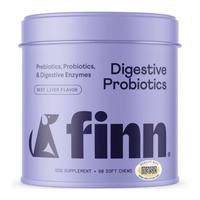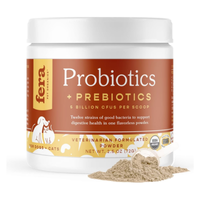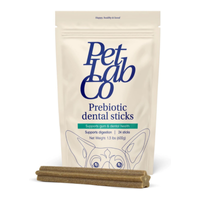Prebiotics and probiotics for dogs: do they really need them?
A vet answers everything you need to know about prebiotics and probiotics for dogs.

Prebiotics and probiotics for dogs can be a great addition to your pooch’s diet if they struggle with digestion issues. Whilst you may be familiar with some of the benefits, you might have a few questions that you’re still a bit unsure about (like what the difference is between the two).
When it comes to your dog’s health and diet, we know you want the best for them. Whether it’s stocking the cabinet with some long lasting dog chews for added nutrition or giving them the best dog food for a well-balanced diet. So, if they’re still struggling with issues like digestion, you might be left scratching your head a bit.
With the help of our trusty vet Rebecca MacMillan, we’ve answered the most common questions that pet parents have about prebiotics and probiotics for dogs. From the benefits to whether you can give them human supplements, consider this your complete guide:
Prebiotics and probiotics for dogs: what's the difference?
A common question is, ‘What’s the difference between prebiotics and probiotics?’ They sound pretty similar (right?) but it turns out that they’re actually completely different.
Dr. MacMillan explains: “Simply put, probiotics are made up of the ‘friendly’ bacteria that typically live in our guts and prebiotics are the ‘food’ that these bacteria like to eat. Prebiotics consist of certain types of fiber that allow healthy gut flora to readily multiply. It should be noted that not all fiber acts as a prebiotic, only particular types.”
If you’re wondering what gut flora is, it’s the group of bacteria (and other microorganisms) that live in the intestines.
“Probiotics are supplements consisting of beneficial amounts of live gut bacteria including microorganisms like lactobacillus species, bifidobacterium species, and enterococcus species.”

Benefits of prebiotics and probiotics
Prebiotics and probiotics are crucial to the body, and make sure that the gut gets enough healthy bacteria. Not only does this support normal digestion but it’s also a defence against harmful microorganisms.
Do I need to give my dog prebiotic and probiotic supplements?
Dr. MacMillan says that whilst most animals have a healthy digestive tract (the organ that digests and absorbs nutrients), some dogs might need a little helping hand.
The only time a dog will need a supplement is when they’ve been diagnosed with problems like exocrine pancreatic insufficiency, a condition where food cannot be digested by the small intestine.
Finn Digestive Prebiotic & Probiotic Supplement for Dogs
A supplement and treat all in one? We’re sold. Your dog will love the taste of these beef liver bites while reaping the benefits of the prebiotics, probiotics, and digestive enzymes.
Are there any side effects?
You might be worried about potential side effects when introducing a new supplement into your dog’s diet. But rest assured, Dr. MacMillan says there are no side effects to these and you can even buy them over the counter.
She adds: “Many owners use them for a few days if their dog is otherwise bright with some loose motions, or if they have eaten something recently that disagrees with them.”
Can I feed my dog human prebiotics and probiotics?
If you’ve got your own prebiotics and probiotics lying around the house, you might be tempted to give them to your dog as well. However, Melissa advises using dog-specific products that are suited to them.
Dr. MacMillan says: “This will be tailored to the types of organisms that are most beneficial to canine digestive health and will also have instructions about the correct doses that you need to give your pet to be effective. Some diets designed specifically for digestive health contain prebiotics as part of their formulation which will help your dog’s gut bacteria thrive.”
Fera Pets Probiotics with Organic Prebiotics for Dogs & Cats
This prebiotic and probiotic combo contains 12 strains of good bacteria, helping your dog with their digestive system. You’ll be pleased to hear that it’s flavorless too, making it easy to mix into your dog’s normal food.
Should I consult my vet first?
If your dog suffers from ongoing stomach issues, blood in their stools or they seem sick, Dr. MacMillan advises consulting your vet. There are lots of reasons why your dog might vomit or have diarrhea (such as parasites, infections, or underlying disease processes) so it’s important to get them checked out.
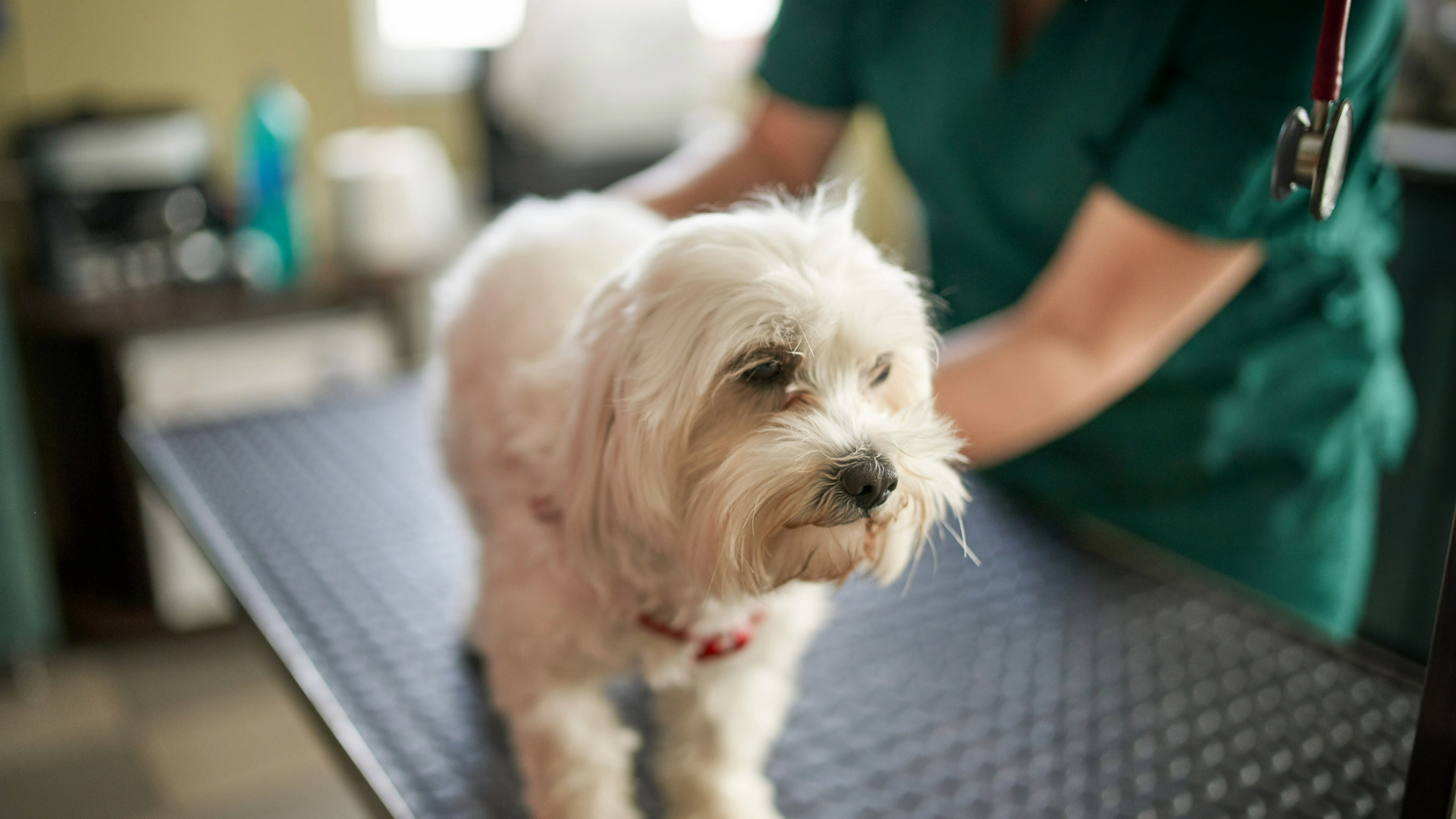
What are digestive enzymes?
The body produces proteins called digestive enzymes to help break down food molecules.
If your dog is not eating, make sure you read our guide on how to increase a dog's appetite.
PetLab Co. Prebiotic Dental Sticks Dog Dental Chews
Prebiotics come in all shapes and sizes, and if your dog loves a chew then they’ll love this dental stick. Not only will it keep their pearly whites in order, but it also contains chicory root - a natural prebiotic that supports the immune system and digestion.
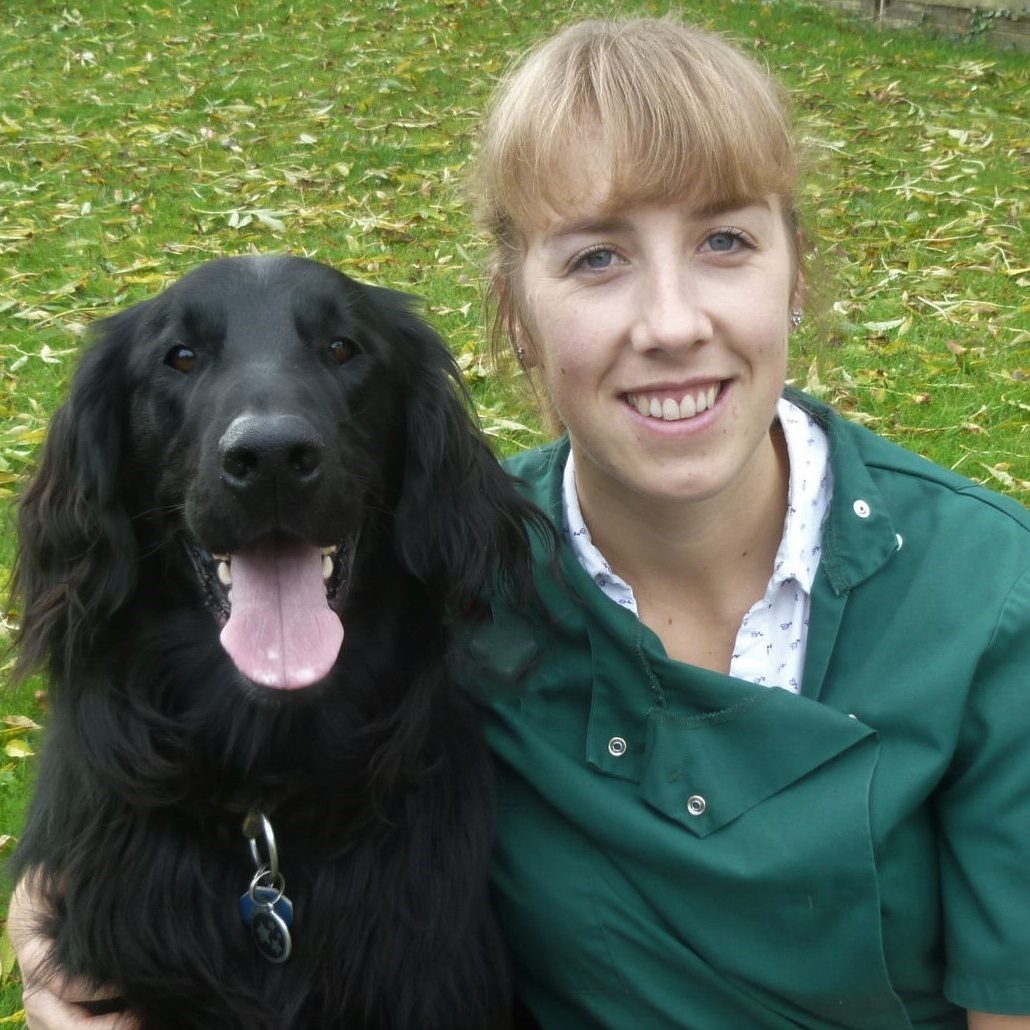
Dr. Rebecca MacMillan is an experienced veterinary surgeon who graduated from the Royal Veterinary College in 2009. Over the years, she’s done a mixture of day-to-day routine work, managerial roles, and on-call emergency duties in a first-opinion small animal practice. She recently achieved a BSAVA postgraduate certificate in small animal medicine (with commendation)
PetsRadar Newsletter
Get the best advice, tips and top tech for your beloved Pets

Megan is a Staff Writer at PetsRadar, covering features, reviews, deals, and buying guides. She has a wealth of experience caring for animals, having grown up with dogs, cats, horses, guinea pigs, and more throughout her life. She studied BA Journalism at the University of Westminster, where she specialized in lifestyle journalism and was editor of Smoke Radio’s lifestyle website. Megan works alongside qualified vets and accredited trainers to ensure you get the best advice possible. She is passionate about finding accurate and helpful answers to your pet-related questions.
